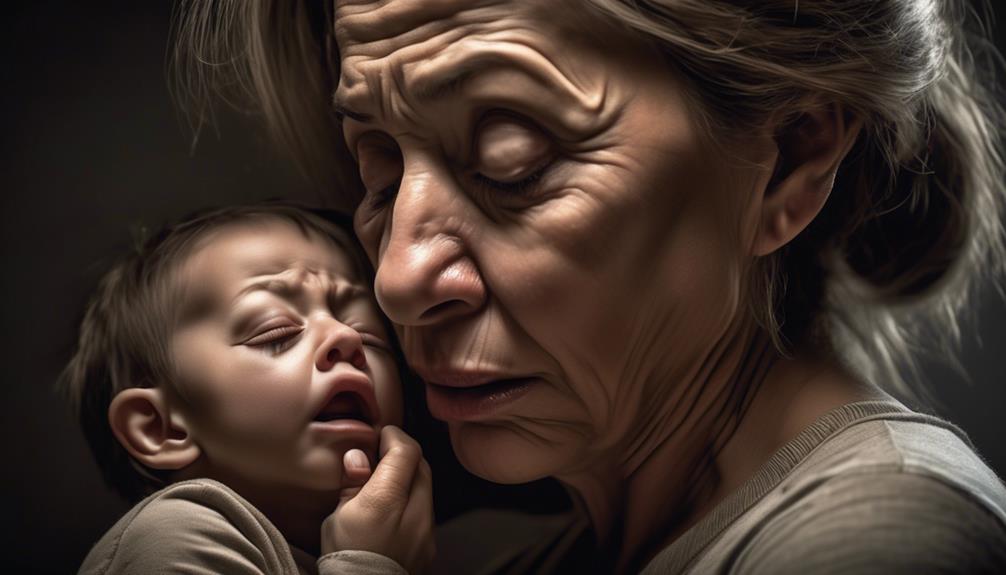Exploring the intricate link between covert narcissism and mortality raises interesting questions about how individuals with this trait cope with the idea of death. By delving into this subject, we can begin to unravel the different emotional reactions and behaviors exhibited by those with hidden narcissism when faced with mortality.
From seemingly contradictory reactions to unique coping mechanisms, the connection between covert narcissism and mortality unveils a fascinating yet enigmatic aspect of human psychology that warrants further exploration.
Key Takeaways
- Covert narcissists struggle with grief due to their self-image and superiority complex.
- Covert narcissists' reaction to death focuses on personal impact rather than genuine emotional processing.
- Experiencing death disrupts covert narcissists' relationships and threatens their self-image.
- Covert narcissists struggle to reconcile their perceived superiority with intense emotions brought on by loss.
Understanding Covert Narcissism and Mortality
Understanding the impact of covert narcissism on an individual's ability to navigate grief and mortality is crucial for developing effective strategies in managing relationships with such individuals.
Covert narcissists, by their very nature, struggle with grief as it directly challenges their carefully crafted self-image and superiority complex. The process of grieving necessitates accepting personal responsibility and acknowledging mistakes, actions that covert narcissists vehemently avoid.
Confronting grief forces these individuals to come face to face with their own vulnerability and the stark disparity between their idealized self and the harsh realities of life. While grief serves as a fundamental component for personal growth and resilience, covert narcissists often opt to deny or shift blame onto others for their losses, hindering their emotional development.
Recognizing and understanding covert narcissism is paramount in navigating the intricate dynamics of grief and mortality within relationships involving such individuals. By grasping the intricacies of covert narcissism, one can better comprehend the complexities that underlie their responses to mortality-related challenges.
The Covert Narcissist's Reaction to Death

Navigating the realm of covert narcissism in relation to mortality confronts us with the stark reality of how these individuals grapple with the concept of death. Covert narcissists, often entangled in the complexities of borderline personality disorder, exhibit a distinct reaction to death rooted in their narcissistic personality traits.
Grief, a natural response to loss, poses a significant challenge for covert narcissists as it forces them to confront vulnerability and imperfection, concepts antithetical to their self-image of grandiosity and superiority.
Their aversion to admitting fallibility and the fear of losing control contribute to their struggle with grief. Instead of processing their emotions in a healthy manner, covert narcissists may resort to denial, blame-shifting, or even experiencing a mix of conflicting emotions such as joy and freedom intertwined with grief.
This complex reaction highlights their self-centered approach to death, focusing primarily on how the loss impacts them personally rather than engaging in genuine emotional processing. The reluctance to accept the reality of loss and the associated personal growth impedes their ability to navigate the grieving process effectively.
Impact of Death on Covert Narcissist Relationships
Experiencing the death of a significant other can profoundly disrupt the delicate web of relationships woven by covert narcissists. When faced with death, a covert narcissist feels an intense threat to their carefully constructed self-image of invincibility and superiority. This disruption often leads to a range of complex emotions and behaviors that can further strain their relationships with others.
| Emotions/Behaviors | Impact on Relationships | Strategies for Coping |
|---|---|---|
| Denial | Avoiding grief and reality | Seeking therapy or support |
| Blaming Others | Escaping responsibility | Encouraging self-reflection |
| Avoidance of Grief | Preventing emotional growth | Engaging in self-care practices |
| Fear of Loss of Control | Maintaining power dynamics | Developing communication skills |
Understanding how death affects covert narcissists' relationships is crucial in navigating these challenging situations. By recognizing the unique struggles and coping mechanisms of covert narcissists in the face of death, one can approach these relationships with empathy and a deeper understanding of their complex emotional landscape.
Coping Mechanisms of Covert Narcissists With Grief

In coping with grief, covert narcissists often struggle to reconcile their perceived superiority and invulnerability with the intense emotions brought on by loss. The clash between their grandiose self-image and the overwhelming feelings of grief can lead to inner turmoil and confusion. Covert narcissists may find it challenging to acknowledge their vulnerable emotions, as it contradicts their facade of strength and control. This internal conflict can result in a complex grieving process, where they may experience a mixture of denial, anger, and sadness.
The coping mechanisms of covert narcissists with grief can vary widely. Some individuals may attempt to suppress their feelings, refusing to acknowledge their pain in fear of appearing weak. Others might display outbursts of anger or irritation as a way to mask their underlying emotions. In certain cases, covert narcissists may temporarily restrain their narcissistic tendencies while grieving, only to revert to their usual behaviors once the initial shock subsides.
Unveiling Covert Narcissists' Mortality Complex
With a deep-rooted fear of facing their mortality, covert narcissists navigate a complex web of emotions when confronted with the reality of loss and grief. This mortality complex stems from unresolved issues in their mental health, often originating in early childhood experiences. Covert narcissists' reluctance to acknowledge their mortality is intertwined with their fragile self-image and deep-seated insecurities. The prospect of death serves as a stark reminder of their imperfections, challenging the illusion of perfection they strive to maintain.
In the face of mortality, covert narcissists exhibit avoidance behaviors, such as denying grief, blaming others, or resorting to falsehoods to evade the acknowledgment of loss. The acceptance of mortality requires individuals to confront the stark disparity between their idealized self and the harsh reality of their limitations. For narcissists, this confrontation represents a direct assault on their carefully constructed facade of grandiosity and invulnerability.
Consequently, their resistance to accepting mortality reflects a broader pattern of fragile self-esteem and an inability to cope with feelings of vulnerability and inadequacy.
Frequently Asked Questions
How Does a Covert Narcissist Deal With Death?
When addressing how individuals cope with death, it's crucial to consider various psychological responses. Individuals may exhibit a range of reactions influenced by their personality traits and coping mechanisms.
Understanding these diverse approaches is essential for providing effective support and intervention strategies. By exploring the complexities of grief and its manifestations, we can deepen our comprehension of human behavior in the face of mortality.
What Hurts a Covert Narcissist the Most?
What hurts us the most is a threat to our sense of superiority and control. Challenges to our perceived invincibility and admiration can be deeply unsettling. The vulnerability and emotional discomfort that come with such threats can shake our core beliefs.
Anything that undermines our need for constant validation and attention can cause significant distress. In essence, any situation that exposes our limitations and inability to maintain our desired image can be profoundly painful.
What Is the Death Stare of a Covert Narcissist?
When a covert narcissist gives the death stare, it's a calculated move. This icy gaze pierces through, instilling fear and asserting dominance. The intensity is meant to belittle and control, a weapon in their manipulation arsenal.
It conveys their sense of superiority and contempt, leaving the recipient feeling small and invalidated. It's a warning sign of the toxic behavior lurking beneath their facade, a glimpse into the darkness of their abusive tendencies.
What One Thing Leads to a Covert Narcissist Final Discard?
When a covert narcissist reaches the final discard stage in a relationship, it's typically triggered by their insatiable need for control and validation. Once their partner no longer fulfills these needs or poses a threat to their perceived superiority, the narcissist may discard them.
This abandonment is a calculated move to maintain power and dominance, often leaving the partner feeling confused and damaged. It's a ruthless act driven by the narcissist's relentless pursuit of self-gratification.
Conclusion
In conclusion, the complex interplay between covert narcissism and death unveils a stark reality of self-centered reactions and defense mechanisms.
The impact of mortality on these individuals can be overwhelming, as they navigate a web of mixed emotions and material concerns.
As we delve deeper into the psyche of covert narcissists, we uncover a mortality complex that's as intricate as it's revealing, shedding light on the profound depths of their self-absorption.











